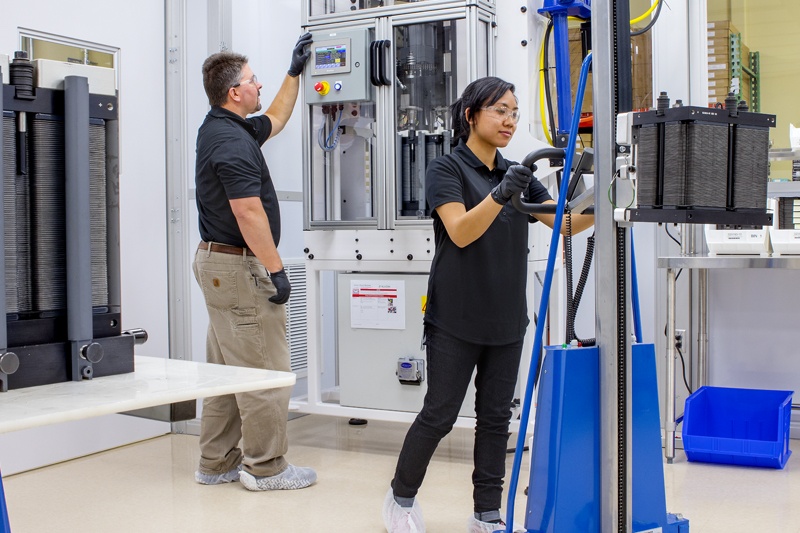Massachusetts citizens pay a price for being at the end of the energy pipeline: increasing costs, supply volatility, and dependence on energy from outside the state and region. Massachusetts has the opportunity to significantly impact the local economy by leveraging the Commonwealth’s entrepreneurial know-how, venture capital, and quality workforce to bolster its leadership in the creation of advanced clean transportation solutions.
Hydrogen is an increasingly important part of the region’s current clean energy economy. Why? Simply put, hydrogen offers the benefits of electricity with the convenience of fuel. The result: Zero emissions. Zero compromise.
As noted in CommonWealth magazine by Morry Markowitz, president of the Fuel Cell and Hydrogen Energy Association, “The Bay State is already staking a claim to be the leader in the Northeast’s push for clean fuel cell vehicle technology.”
Made in the U.S.A. Nuvera® fuel cell stacks and engines
being manufactured locally in Billerica, Mass.
Examples today include:
- Over 300 Massachusetts companies are part of the Northeast region’s hydrogen and fuel cell industry supply chain. (See Northeast Electrochemical Energy Storage Cluster – Massachusetts Hydrogen Economy.)
- On-site hydrogen generation and drop-in fuel cell power systems are transforming forklift operations, demonstrating 6 value drivers for a large distribution facility in Massachusetts.
- The MBTA is successfully demonstrating a hydrogen fueling station for a zero-emissions fuel cell transit bus currently serving routes in Boston.
- Hydrogen station sites have been permitted and are pending construction in Mansfield and Braintree as part of an initial network of twelve northeast U.S. hydrogen stations.
- The Massachusetts MOR-EV program offers a solid example in offering tax credit parity for all zero-emissions vehicle technologies – battery electric vehicles and fuel cell electric vehicles.
- Participation in H2USA, a national initiative to promote the expansion of hydrogen fueling infrastructure for fuel cell vehicles.
- Membership in the Multi-State ZEV Task Force.
- Hydrogen generators and fuel cellpower systems designated eligible for Mass Save® energy efficiency incentives in new construction and retrofit programs for materials handling forklift operations and other businesses considering hydrogen solutions.
Massachusetts can build on these hydrogen fuel cell advancements. To go even further, the Commonwealth’s development authorities and policy makers can look to California for examples of successful hydrogen and fuel cell markets that can be adapted to meet the Northeast’s demands for transportation convenience, energy efficiency, and environmental health.
Nuvera is an industry member of the Fuel Cell & Hydrogen Energy Association.
Visit www.fchea.org for more information.
RELATED ARTICLES
The Washington Times:
Fuel Cells – The ‘Triple Crown’ Winner for America’s Energy Future
Nuvera Blog:
Discover How Hydrogen and Natural Gas Are Good News for a Renewable Energy Future
